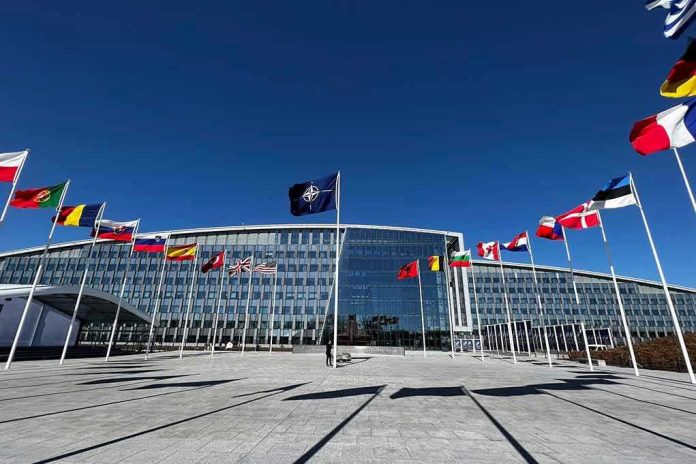
President Trump’s unwavering pledge to defend Poland and the Baltic states against Russian aggression marks a sharp reversal from years of weak border enforcement and globalist appeasement, reinforcing America’s commitment to NATO and conservative principles of strength and national sovereignty.
Story Highlights
- President Trump declared the US will defend Poland and the Baltic nations if Russia escalates military provocations.
- Recent Russian drone and fighter jet incursions into NATO airspace have raised the risk of a broader conflict in Eastern Europe.
- NATO scrambled jets to intercept Russian threats, while Estonia invoked emergency measures at the UN Security Council.
- Trump’s public stance demonstrates a restoration of American resolve, contrasting sharply with previous downplaying of threats.
Trump’s Commitment: Defending NATO’s Eastern Flank
On September 21, 2025, President Donald Trump issued a stern warning: the United States would stand with Poland and the Baltic states—Estonia, Latvia, and Lithuania—if Russia escalates its recent aggressive actions. This announcement followed a surge in Russian military provocations, including drone incursions over Polish airspace and fighter jets violating Estonian borders. Trump’s direct statement signals not only a renewed commitment to NATO’s Article 5 collective defense but also a decisive rejection of the indecision and weakness that characterized previous administrations.
Trump’s stance comes after a series of troubling incidents. On September 10, approximately 20 Russian drones entered Polish airspace during attacks on Ukraine, prompting NATO aircraft to intercept these threats for the first time. Just days later, Russian MiG-31 fighters breached Estonian airspace, underscoring a pattern of deliberate provocation. While Trump initially suggested the drone incident could have been a mistake, his later commitment made clear that American security guarantees remain firm and unconditional when the freedom and sovereignty of allies are at stake.
Escalating Russian Provocations and NATO’s Response
The context for Trump’s commitment is a rapidly deteriorating security environment along NATO’s eastern border. Russia’s ongoing war in Ukraine has spilled over into neighboring states, with airspace violations now occurring with unprecedented frequency. These actions have forced NATO to heighten its military readiness, increasing air patrols and deploying additional resources to frontline states. Estonia responded to the latest violations by calling an emergency meeting of the UN Security Council, a move that highlights both the seriousness of the threat and the growing anxiety among America’s allies.
For years, Eastern Europe has endured the consequences of Western appeasement and lackluster responses to Russian aggression. Under previous administrations, vague red lines and half-hearted sanctions emboldened adversaries and left America’s friends exposed. Trump’s administration, in contrast, has prioritized deterrence, military strength, and a clear articulation of American interests. His message to Moscow is unmistakable: any attack on Poland or the Baltic states will trigger a robust and immediate response from the United States and its allies.
Alliance Unity and Constitutional Values at Stake
President Trump’s actions resonate with core conservative values—national sovereignty, strong defense, and the sanctity of alliances grounded in mutual respect and shared interests. These principles stand in stark contrast to the previous era of globalist overreach, open borders, and reckless fiscal policies that endangered both American security and prosperity. The ongoing Russian provocations are not just a regional issue; they are a test of the resolve of the free world and the integrity of the NATO alliance. Trump’s commitment reinforces the constitutional duty to provide for the common defense and to honor America’s word abroad.
Security experts and regional leaders agree that Russia’s actions are deliberate attempts to probe NATO’s unity and test the credibility of its deterrence. The Lithuanian defense minister described these incursions as “deliberate provocations,” warning that repeated violations could lead to miscalculation and broader conflict. Trump’s firm stance aims to deter such escalation and reassure allies that the United States, under conservative leadership, will never waver in the face of external threats. This return to strength and clarity is exactly what American patriots have demanded after years of weakness and drift.
Regional Stability and Conservative Priorities
The implications of Trump’s commitment are far-reaching. In the short term, increased military readiness and air patrols will help secure NATO’s eastern flank and deter further Russian aggression. Long-term, this approach may require greater defense investment and a re-evaluation of alliance strategies to ensure that American interests and values remain protected. For the people of Poland, Estonia, Latvia, and Lithuania, Trump’s words offer reassurance that the US stands with them against tyranny. For American conservatives, this is a powerful reminder that strong leadership and an unwavering defense of liberty are not optional—they are essential to the survival of the free world.
Sources:
Dawn: Trump’s pledge to defend Poland, Baltics after Russian airspace incursions



